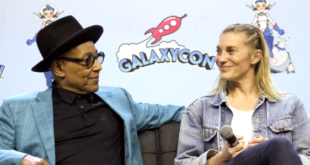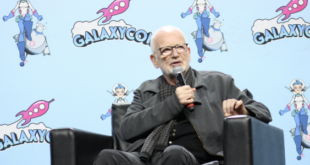To "The Lighthouse":
"You should probably get a pen. You'll have to write a few things down." — Jacob
Okay. Will 1500 words do?
In lieu of advancing a real plot, last night's Lost did what it has always been known to do. And why not? It does it well — stirring up the pot of mystery. Instead of answering a couple more questions as Lost approaches its series finale, the show introduces a new character and re-introduces old ones complete with new personas. Example: Feral Claire and John Locke turned Smokey or Smokey-Cain-Half-Locke whom I affectionately refer to now as Schlocke. New character? Sideways Jack now has a son because all the best cowboys have daddy issues as we found out back in season one. Cowboy Jack will have a chance to do this Daddy thing better than his old man.
"The Lighthouse," directed by Jack Bender, reinforces the idea that this last season of Lost will be a parallel to its first season. A sideways season, if you will. Or to quote Hurley, as we always should do: "This is old school. Trekking through the jungle, doing things we don't quite understand."
Episode four, "The Lighthouse," has unfortunately little to do with the Virginia Woolf novel, unless you search really hard for allusions to cold and distant fathers, Mr. Ramsey, cough, cough. We find out in "The Lighthouse" that in his alternate reality, Jack Shephard has a son, young David, who does look a lot like his dad so no DNA testing is apparently necessary. Sideways Jack is a caring father who doesn't drink like his previous incarnations except for the occasional beer with his pizza, and who can blame him for that. This Jack is a good dad but perhaps a bit neglectful, indicated by his being late to pick up his son from St. Mary's Academy. But at least the boy is getting a good education. Father and son are matchy-matchy with navy blazers and blue shirts, indicating the possibility of future simpatico, at least in a Ralph Lauren sort of way.
Jack gets a chance to redeem himself with his son, proving that he is not his father. Daddy issue resolved. There remains one pressing mystery: if Mama Shephard was indeed married to a physician at one time, couldn't she have found a better plastic surgeon for that facelift?
Mom and Jack tear apart Christian Shephard's study — looking for that last will and testament which conveniently shows up, clearly marked "Last Will and Testament." Papa Shephard had a thing for Sharpies. Metaphorically, meaning outside the need for better physician consultation for cosmetic surgery, Jack's storyline is his search for his inheritance. At one time, his patrimony seemed to be alcoholism, neglect, and disparagement. His options, because there are "always options," are the bottom of a glass or to follow the road not taken by his father. As we have seen so far this season, the sideways lives of the characters are often a bit askew from our past understanding of their histories, and often the characters are in a better place than when we first met them way back in season one. Jack seems to be taking the high road here.
The Jack storyline was moderately interesting. David is musical, very musical in fact, like his Biblical antecedent, and what parent wouldn't be thrilled at that discovery? Admit it, having a prodigy for a child makes being a caring, concerned parent that much easier. What if it turned out that David was extremely talented at Xbox rather than the piano? Would Jack have been that motivated at being Great Dad? But I quibble. The piano recital gave us a chance to see another unexpected sideways character – Dogen – making an appearance in the parallel life as a parent of another child at the conservatory audition. "It's hard to watch and not be able to help." Dogen foreshadows possible events on the island — perhaps his beheading of everyone not a candidate?
"The Lighthouse" is heavily Jack-centered. He is the candidate after all, and he needs to get on with his brooding, but the episode's best moments were with Hurley. Aren't they usually? If Jack seems somewhat better off in his sideways life, Hurley appears to be in a much better place there. We saw a glimpse of that last week when John Locke meets him in the parking lot of Hurley's paper company. Hurley magnanimously gives Locke a new job upon hearing that he had been (justly) fired. Frankly, I love magnanimous Hugo. It so seldom happens to this character. Usually Hurley is lumbering behind, following orders, cracking wise: "I just lied to a samurai." In "The Lighthouse," the light shines on Hurley too.
If Jack is candidate material, what with his sulking and smashing of glass, let's not forget that Hurley is a candidate too. A much more receptive candidate at that. Are you listening to my opinion, Jacob? So what if his name doesn't begin with the initial "J" like all the other candidates do: Jack, John, James, Jarrah, and maybe Jin. Hugo is his own man. And anyway, his real name begins with a "J" as in Jorge. So there. I would argue that Hurley makes a better leader than Jack who is still all self-absorption and mood. Although Jack is improving in his leadership qualities; he is listening more and actually gives a clear-cut honest answer to Sayid when explaining to him what was in the pill. Answers! We love them.
Hurley, as foreshadowed last week with his "chin up, things will work out" pep talk to handicapped John Locke, brings the same optimism to this week's episode. As much as Jack embodies the unwilling hero, Hurley is firmly in the unlikely hero tradition, much like the Indiana Jones that he is a fan of, as he tells Dogen. On the surface, Sawyer would be that Indiana Jones dramatis personae; he certainly has the me-first temperament, action hero physique, and sarcasm, but I would argue that when all this raps up, Hurley, more so than Jack, John, or James, will emerge as the hero. He has the ability to listen ("if you have any idea on how to get Jack to go on your little adventure, I'm listening dude") and to communicate ("I think you'd make a great dad"). He reminds Jack that "it doesn't work like that, I told you," echoing Myles to Sawyer from the season opener. In contrast to Jack who goes around breaking things yet again when plans don't go his way, Hurley is not so easily rattled.
I've left Feral Claire for last, and not because it's best, but because whenever this character appears onscreen, it reminds me of Rosseau and how unjustly that character was served by the Lost writers. I knew Rosseau, and Claire, you are no Rosseau. There were a few surprises in Claire's story, but one of them was not who her "special friend" was. The appearance of Schlocke was not a shocker. Jin probably saved Claire's life, but was it for the best? It definitely was at the expense of Justin, further strengthening the theory that it is dangerous to be black on Lost, e.g. Mr. Eko, Walt, and Michael. Thank goodness for Rose.
I've run out of my allotment of words today, so I will leave you with these thoughts on why Lost isn't just a pretentious version of Gilligan's Island:
About the physical injuries to Jack that seem to be seeping through from the island life to the sideways life: We saw the wound to his neck in the season's first episode, and now we see the rather fresh appendectomy scar he received from season four's "Something Nice Back Home." And there is something nice back home – he has a clean apartment, a musical prodigy as a son, pizza, and beer. Who needs to be an island hero when you have all that?
About the giant compass navigating lives in the lighthouse: Jack resented the watchfulness of Jacob into his life, smashing all the reflecting mirrors. Did it remind anyone else of Tommy in The Who's rock opera? Using heavy metaphor to escape his childhood, Jack shatters glass in the Lighthouse and tells Hurley about how he destroyed his father's coffin.
About the speculation that the imagery of black and white (as in cowboy hats) are inverted: Could the Man in Black be a positive force while Jacob is really evil? I just don't buy it for the simple reason that when Jacob appears on screen, I feel a sense of relief. Sure, on close observation, Jacob looks creepy with his hooded eyes and enigmatic smile, but we have to trust Hurley's instincts. When he refers to Jacob as Obi Wan Kenobi, I think we have to go with it.
About the continual presentation of the characters at a mirror or at a reflecting pool: Here there is the obvious reference to Alice in Wonderland: David is reading the book to his father's delight, also to ours because we have sat through "White Rabbit" and "Through the Looking Glass" episodes in season three. There is also a possible reference here to the Narnia books, specifically The Magician's Nephew, where the characters use reflecting pools to time travel. When Kate, Jack, John look at themselves in mirrors, look through or at water, could they be glimpsing their other realities? Can water (after all, the island is underwater at the beginning of the season) be the gateway to convergence?
And who is coming to the island?
Til next week, namaste.
 Blogcritics The critical lens on today's culture & entertainment
Blogcritics The critical lens on today's culture & entertainment



